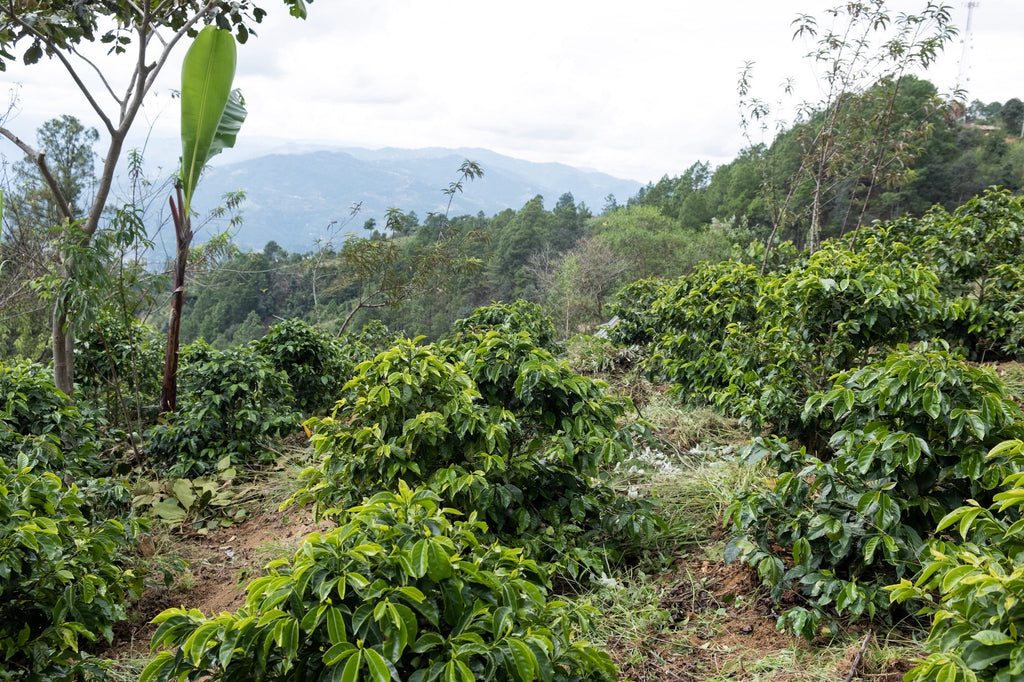By Bram De Hoog, Ally Coffee Buyer for Central America

Los Arroyos satellite mill. All photos by Bram De Hoog for Ally Coffee.
Ceiba is Ally’s Core Coffee from Huehuetenango, Guatemala. Core Coffees are smallholder-grown community lots that deliver the best regional cup characteristics. On a recent trip to Guatemala, Bram de Hoog, Ally’s buyer for Central America, had the opportunity to visit two communities where coffee for Ceiba is grown: La Libertad and Santa Barbara.
La Libertad, Huehuetenango
Los Arroyos is a farm in La Libertad, Huehuetenango. They operate about 50 hectares of coffee production in an extremely rugged terrain. Some of the slopes this coffee grows on are steeply inclined and cultivation requires careful logistics. Los Arroyos has four wet mills to process the coffee in the coffee fields before bringing it down to the central mill and patio where they dry the coffee on concrete patios and in mechanical driers. The farms have elevations between 1400 and 1800 meters above sea level and are operated by Felipe Venenciano Martinez Lopez and his three sons. As is the case in most of Huehuetenango, Los Arroyos grows Caturra, Catuaí and Pache varieties.


Felipe Venenciano Martinez Lopez and his three sons (first). Felipe’s son with Chris, Martin, and Betty of Unitrade team (second).
Los Arroyos is one of the contributing farms to Ally’s Ceiba Core Coffee from Huehuetenango. It takes a lot of work to build a community lot with a specific, repeatable cup profile. The Ceiba project involves 1,800 producers spread out over most of Huehuetenango. The majority are extremely small producers. A common farm size is 500–1,000 coffee trees, about one fifth of a hectare. Nevertheless, all producers process and dry their own coffee, sometimes on their own properties and often in a cluster with family members. When coffee from Los Arroyos and other farms in La Libertad arrives at Unitrade, our export partner for La Ceiba, lots with fruity notes are allocated to build each Ceiba lot.




Santa Barbara, Huehuetenango
On the second day in Huehuetenango, I visited the Santa Barbara region. The drive up to the town is along a dry dirt road that winds through the hills. I met with a team of ten agronomists that work with clusters of roughly thirty producers across Huehuetenango. They give free monthly workshops that cover a broad range of subjects related to coffee production, processing, and sustainable practices. The results of the workshops are evident in practices like drainage holes for residual water from processing.
The average farm size in Santa Barbara is about one fifth of a hectare and many producers tend around 500 coffee trees, yielding a maximum production of five bags per producer. Many producers live with their families on the farm and work their plots collectively to pool the coffee at the time of sale. Most people in Santa Barbara belong to indigenous groups and have traditions, languages, and cultures distinct from Hispanic Guatemalans. Many of the agronomists working for Unitrade speak and give workshops in indigenous languages.
Santa Barbara’s elevation is a mind-blowing 2340 meters above sea level, which has a direct effect on the coffee trees. Most are small and have dense branches, tiny cherries, and a flatter look. Most producers share very basic depulping machines with their family members and they ferment the coffee in plastic buckets and at times wooden tanks. Because of the high altitude and colder temperatures, the fermentation can take up to 48 hours. After fermenting, the coffee is washed in its own tank. These factors contribute to the unique profile of Huehuetenango and the fruity notes we love so much.






Giving Back with Coffee Care
On the way to one of the farms we visited, we stopped by a school established by the Guatemalan NGO Coffee Care. In 2004, Coffee Care was founded by Unitrade as an independent NGO in order to battle some of the problems often encountered in the rural coffee production regions. In regions such as Huehuetenango, the access to education, proper nutrition and health services can be very basic or even non-existent. Coffee Care focuses on these three pillars of education, nutrition, and health in order to better support the coffee producers in this region. A direct consequence of this program is the construction of three schools and a clinic on partner farms. Through these schools, the kids have access to education and nutrition during the day when their parents are working in the fields.
Ally’s Ceiba Core Coffee is a community lot in the truest sense; coffee is grown by many members of the community, and our export partner for sourcing this coffee is involved in giving back to the community through Coffee Care and through agronomy trainings. Ceiba Core Coffee is the result of teamwork and collaboration from the farm to the quality control lab, and we look forward to continuing to build this partnership together.
Talk to your Account Manager or fill out the Sample Request form on our website to try Ceiba for yourself!

